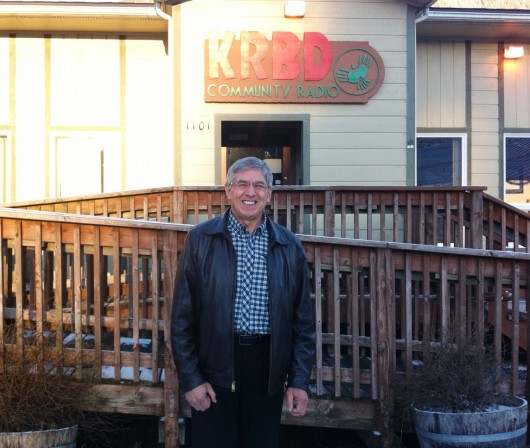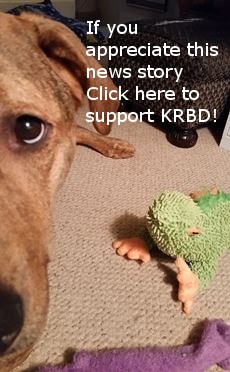
Byron Mallott poses at KRBD-FM in Ketchikan. (KRBD file photo)
Lt. Gov. Byron Mallott was in Ketchikan and Metlakatla this week. He attended the Founders Day celebration in Metlakatla on Monday, and then stopped by KRBD Tuesday for a quick interview.
Alaska’s lieutenant governor spent a full day in Metlakatla, helping to celebrate the 130th anniversary of the state’s only Native reserve. He said he and his wife traveled from Ketchikan to nearby Annette Island in style, on a high-speed U.S. Coast Guard vessel.
They walked in the annual Founders Day parade, handing out candy to children. Mallott said he also was able to catch up with friends.
“My hometown was Yakutat, and we did not have a high school,” he said. “Villages didn’t in those days. We didn’t get high schools in those communities until the mid- to later-70s. So we all went to boarding school. I went to boarding school in Sitka with a number of folks from Metlakatla. So, I have old friends there. It was great.”
Mallott said he travels extensively for his job, so he can hear directly from Alaskans throughout the state. Some big projects he’s spearheading for the state involve transboundary mines, fisheries and creating a state climate-change policy.
Mallott said the climate change project is important to Alaska, in particular, because this state is the first to be affected by global warming.
“We have villages that need to be relocated. We have impacts that we’re seeing with permafrost melting and the permafrost line moving further north,” he said. “There’s so much — temperature change. We need to stay on top of it.”
 Mallott said that project will involve working on state policies, identifying resources, and cooperating with neighboring nations and the federal government on Arctic policies.
Mallott said that project will involve working on state policies, identifying resources, and cooperating with neighboring nations and the federal government on Arctic policies.
Mallott addressed a recent announcement that all king salmon fishing in Southeast salt water has been closed. He said reduced king-salmon returns in recent years have been a concern statewide, and the closure underscores the ongoing problem.
He said there are many who believe it’s related to climate change.
“Ocean temperatures are changing, weather patterns are changing. Ketchikan, if it comes to Alaska, could be the first significantly affected – that is, this lower area of Southeast Alaska – with ocean acidification. I think they felt it a little bit out on POW already,” he said.
Mallott said Fish and Game researchers are trying to keep an eye on the fisheries and how ocean changes might affect returns. But, he said, budget cuts have affected that and many other departments.
He responded to some Alaskans’ call for further budget cuts. He agrees the state government should always look at ways to be more efficient, but he said the state’s budget is reaching a level where if wholesale cuts continue, Alaska will become a second-class state where people don’t want to live.
“I didn’t spend my whole life, living in Alaska trying to make it better to suddenly find us at a place where Alaskans are willing to accept second best in order to keep a dollar in their pocket,” he said. “That’s not the kind of people we are. Other than that, I don’t give a damn.”
While not making a formal announcement, Mallott and Gov. Bill Walker have said they intend to run for re-election next year. Two challengers have filed to run for the lieutenant governor job – Republicans Gary Stevens of Kodiak and Lynn Gattis of Wasilla.
Mallott said he welcomes both to the race.
“Elections are an opportunity and a time for the Alaskan public to evaluate an incumbent’s performance, which in this instance is me, of course. And to look at what others say that they might do in the same office. I look forward to that opportunity,” he said.
Speaking of elections, that’s one of the areas Mallott is in charge of statutorily. He said the Division of Elections is always looking at ways to make the process better. Mail-in elections are one possibility for the future.





